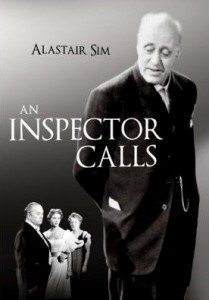A Matter of Conscience
 A couple of nights ago, while checking out vintage flicks on my laptop, I stumbled across a wonderful and thought provoking movie called “An Inspector Calls” starring Alastair Sim.
A couple of nights ago, while checking out vintage flicks on my laptop, I stumbled across a wonderful and thought provoking movie called “An Inspector Calls” starring Alastair Sim.
The movie is based on a stage play that was written by J.B. Priestly, a playwright who had Socialist sympathies, and who was troubled by the ways the lower classes are at the mercy of people with money.
Sim was one of Great Britain’s most popular character actors, and he absolutely dominates every scene in every movie he is in with his wry expressions and mannerisms.
His movies are well worth looking up, and “An Inspector Calls” is an example of Sim at his very best.
The story opens at a dinner party of the upper class Birlings in 1912. This rich Edwardian family is celebrating the engagement of their daughter to one of her father’s business partners.
It’s a full dress dinner party, with the men in tuxedos and the women wearing fancy gowns.
Mom and Dad are delighted with the match, the fiancée looks handsome and dashing, the son Eric is clearly somewhat intoxicated, and the daughter is glowing with a shiny new big rock on her finger.
Suddenly, the French doors to the dining room open, and in walks Alastair Sim. Father, a rich and important industrialist, is put out. How’d this intruder get in, why didn’t he come through the front door?
Sim, whose face droops like a bloodhound’s, introduces himself as Inspector Poole. He’s investigating the recent suicide of a young woman, who he believes was known by this family.
She drank poison, and is laying in the infirmary right now. Inspector Poole suggests that the Birling family, and the fiancée, can shed some light on why this tragedy occurred
.
Father is indignant, and denies knowing the girl. But upon further inspection of the photo Poole presents, he recalls that this girl, Eva Smith, used to work in his factory.
The film then switches to flashback, so we, the audience, can see what happened in Miss Smith’s life.
Eva Smith had been one of a small delegation of women employees who had approached Mr Birling to ask for higher wages. He blustered and stormed at them, intimidating them all except for Eva Smith, who spoke up.
She was clearly a troublemaker, so Mr Birling wasted no time in giving her the sack. He is quite adamant that he did the right thing. Someone like that on staff only causes problems.
Inspector Poole does not comment, he merely listens. But we, in the audience, are watching a rich man defend his selfishness and lack of compassion.
Next up! The daughter now recognizes the girl from a shop she had visited. Eva had gotten a position as a shop girl after losing her factory job, and was present when Miss Birling came into the store one day.
Unfortunately for Eva, Miss Birling was in a bad mood. She felt that the shop girl was insolent, and demanded that the owner sack her immediately. Or she’d instruct her mother to close her account!
Miss Birling is truly contrite when she considers how nasty she was. She is stricken by her conscience, and had never before considered how her actions that day affected the life of Eva Smith.
The inspector next turns to the fiancée. He tries to wiggle off the hook, but is forced to admit under Poole’s sad and steady look of inquiry that he too knew the girl and had had a relationship with her.
And so on with both the mother and the son….and we see how it all went down in the flashback scenes.
Mother was the cruellest of the lot, as it turns out. She had denied Miss Smith any sort of aid or succour when Miss Smith applied for charity at a foundation Mrs Birling headed. Mrs Birling sits at a table with her fellow socialite matrons, all dripping with feathers, furs and jewels as they deny mercy and pronounce judgment on the poor.
Upon learning that Miss Smith was pregnant she imperiously told the poor girl that it was all the man’s fault, that the father of the child was wholly responsible for Miss Smith’s predicament.
The daughter twigs to who the father of Miss Smith’s baby is first, and listens with horror as her mother wrathfully but unknowingly condemns…..her own son.
This movie was a brilliant exploration of how our actions affect the lives of the people we interact with.
And, the movie goes out with a thought provoking flourish…it has a fascinating and nifty twist at the end.
Stephanie Kelley
